para Todos
From: IndiaDivine.org
To:
Sent: Monday, October 12, 2009 10:10 PM
Subject: Ayurvedic Rasayana (The System of Rejuvenation); The City of Dwaraka
Ayurvedic Rasayana
(The System of Rejuvenation)
(The System of Rejuvenation)
Ayurveda has eight branches, and Rasayana (rejuvenation) is one of them. 'Rasa' has different meanings, like ”juice”, "taste“, “essence", "flavor”, or “emotion", but is not limited to any of these in itself. In the therapeutic process Rasa is concerned with the conservation, transformation, and revitalization of energy. Rasa nourishes our body, boosts immunity and helps to keep the body and mind in best of health.
Janamejaya’s Dana Sasana Patram
Emperor Janamejaya was the son of Maharaja Pariksit and the great-grandson of Arjuna. Pariksit was the son of Abhimanyu, and Abhimanyu was the son of Arjuna and Subhardra, and the nephew of Sri Krsna. He took up the Kuru throne following the death of father.
Sri Caitanya's Influence on Durga Puja
Various accounts exist of the origination of Durga Puja in the state of Orissa, and all historical accounts agree that important influences came from many regions outside of Orissa state. Durga Puja is a festival that is observed for 10 days, and in two different ways in Orissa. In Shakti peethas (temples of the goddess) the Durga Puja is observed with proper rituals for 10 to 16 days, known as Shodasa Upachara.
Glories of Sri Krishna Pushya
Abhiseka from Skanda Purana
Abhiseka from Skanda Purana
On the purnima of the month of Pausa, Narayana (December-January), the last day of the astrological month (Pushyami nakshatra), one is instructed to bath the Deity in five seers of ghee (approximately 2.5kg of ghee). According to Hari Bhakti Vilasa, on this day one should rub ghee on the Deity of Sri Krishna.
The City of Dvaraka
Dvaraka (meaning "the many-gated city") is the capital of the Yadavas who ruled the Anarta Kingdom. The city was situated on the western point of Gujarat, and became submerged in the sea, as described in Volume 16 of the epic Mahabharata.
India's Divine Personalities, Printed in Germany
The technique of lithographic printing was one of the greatest German inventions. This new technology not only revolutionized mass production of visual imagery in Germany and Europe as a whole, but it also had a major impact on the religion and the independence movement in India during the late nineteenth and early twentieth centuries.
This newsletter is sent to 123,708 subscribers.
To subscribe or unsubscribe please visit:
http://www.indiadivine.org/newsletter/
To subscribe or unsubscribe please visit:
http://www.indiadivine.org/newsletter/
From: IndiaDivine.org
To:
Sent: Wednesday, October 14, 2009 12:50 PM
Subject: Vedic Origins of the Zodiac; Varaha Upanishad
Vedic Origins of the Zodiac
Some scholars have claimed that the Babylonians invented the zodiac of 360 degrees around 700 BCE, perhaps even earlier. Many claim that India received the knowledge of the zodiac from Babylonia or even later from Greece. However, as old as the Rig Veda, the oldest Vedic text, there are clear references to a chakra or wheel of 360 spokes placed in the sky. The number 360 and its related numbers like 12, 24, 36, 48, 60, 72, 108, 432 and 720 occur commonly in Vedic symbolism.
Srikshetra - A Replica of Indian Culture
Srikshetra, or Jagannath Puri as it is commonly known, is a truthful replica of Indian culture. To understand this culture, one has to have some idea of the history of this land, which is different from that of other countries of the world. Indian history does not contain accounts of imperialistic aggressions or invasions into the territorial integrity of any nation.
Tamil Magnificence: Developments in South India
In the 10th and 11th centuries, the south witnessed the construction of massive temples, great cathedrals in their own right. With the passage of time, the Chola dynasty came to dominate politics in south India. With their progression to power, the small scale of the Pallava masterpieces - the rathas and the Shore temple at Mahabalipuram - was not sufficient as a showpiece of Chola power. The craftsmen were soon to be put to a greater test.
The Caste System in Bengal
While formally there are four castes in Vedic culture: brahmins, ksatriyas, vaishyas and sudras, the social reality of this structure is very different in certain parts of India.
The Life of Sri Madhvacarya
Sripada Madhvacarya took his birth at Udupi, which is situated in the South Kanarada district of South India, just west of Sahyadri. This is the chief city of the South Kanarada province and is near the city of Mangalore, which is situated to the south of Udupi.
Varaha Upanishad
Varaha in the Vedic Literature Lord Varaha is glorified in virtually all of the major Puranas (the Vedic histories), which describe His different descents over the ages.
The Panchala Kingdom
Panchala Kingdom extended from the Himalayas in the north to the River Charmanwati in the south during the period of Mahabharata. The Kuru, Surasena and Matsya kingdoms were to the west, and the forest of Naimisha was to the east. Later, Panchala was divided into Southern Panchala (Panchala proper ruled by King Drupada, the father-in-law of the Pandavas) and Northern Panchala (ruled by Ashwathama, the son of Drona.
This newsletter is sent to 123,974 subscribers.
To subscribe or unsubscribe please visit:
http://www.indiadivine.org/newsletter/
To subscribe or unsubscribe please visit:
http://www.indiadivine.org/newsletter/
From: IndiaDivine.org
To:
Sent: Thursday, October 15, 2009 5:10 PM
Subject: The Vedic Religion in Ancient Iran and Zarathushtra
The Vedic Religion in Ancient Iran and Zarathushtra
Scholars generally agree that before the advent of Zarathushtra, the religion of the devas was current in Iran. For want of a better term, some have called the pre-Zoroastrian religion Persian paganism. But here we argue that to do so is to obscure its connections with the Vedic religion.
Hamsa: The Transcendentalist Swan
Hamsa (or hansa) is the Sanskrit term for a transcendentally situated swan or goose. Considered by scholars to be either the Mute Swan (Cygnus olor) or the Bar-headed Goose (Anser indicus), the Hamsa is best known and loved as the vahana (sacred carrier) of Lord Brahma and the Goddess Saraswati.
Prithvi, the Earth Mother
Prithvi is one of several Sanskrit names for the Earth Mother, more commonly known as Mother Bhumi Devi. Prithvi is the personification of the Earth, and is therefore also known as Prithivi Tattwa, the essence of the element earth. Prithvi is also called Dhra, Dharti, or Dhrithri, meaning 'that which holds everything'.
Scroll Paintings in Lord Jagannath's Orissa
Folk art is an indivisible part of folk culture. The study of folk culture in the subcontinents of India dates back to the 19th century. Some eminent personalities or connoisseurs began to study folk culture absolutely to quench their personal interest.
The Tale of Tuluva Brahmins
The ancient Tulu nadu extended from Gokarna in the north, all along coastal Karnataka down to Kasargod in the south. This included both coastal Uttara Kannada district as well as all of Dakshina Kannada district. Over many centuries, the principal language of Tulu nadu was Tulu, which today is spoken only south of the River Kalyanpur in Udupi and in the Dakshina Kannada districts of Karnataka. This is the heartland of Tulu nadu today.
A Brahmin's Livelihood
Describing how a brahmin should earn his livelihood, Lord Brahma said to Narad: "Alms, which a brahmin gets without making any demand for it is called Vritta. 'Unchhavritti' is even better than Vritti, and it means collecting food grains which are scattered in places like fields, granaries, the market-place, etc.
This newsletter is sent to 124,308 subscribers.
To subscribe, please visit: http://www.indiadivine.org/subscribe.htm
To unsubscribe, please visit: http://www.indiadivine.org/unsubscribe.htm
To subscribe, please visit: http://www.indiadivine.org/subscribe.htm
To unsubscribe, please visit: http://www.indiadivine.org/unsubscribe.htm
A Brahmin's Livelihood
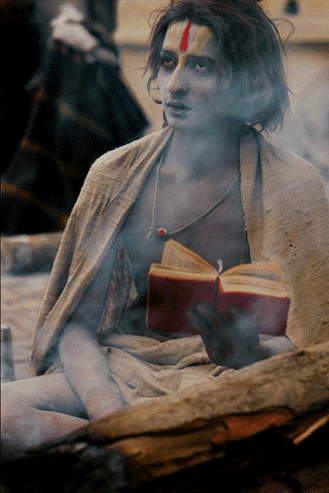
Describing how a brahmin should earn his livelihood, Lord Brahma said to Narad: "Alms, which a brahmin gets without making any demand for it is called Vritta. 'Unchhavritti' is even better than Vritti, and it means collecting food grains which are scattered in places like fields, granaries, the market-place, etc. A brahmin should accept the dakshina that his host gives him after the completion of yagya-ceremony. He should engage himself in educational activities. He can also earn his livelihood by engaging himself in other auspicious activities.
If the circumstances do not permit a brahmin to earn his livelihood by any of the above mentioned means, then he may opt for the occupation of a kshatriya. In such a case, he should endeavor to have mastery both over the Vedas as well as different weaponry. Battle should be his last option. When the very existence of religiousness is at stake, he should wage a war against irreligious people and to protect the religion.
In an emergency situation, a brahmin can also choose the occupation of a Vaishya and earn his livelihood by doing business or agriculture. But, while earning his livelihood by doing agriculture, he should in no circumstances abandon his own duties (duties of a brahmin). He should be honest while doing business and never try to exploit the customers."
If the circumstances do not permit a brahmin to earn his livelihood by any of the above mentioned means, then he may opt for the occupation of a kshatriya. In such a case, he should endeavor to have mastery both over the Vedas as well as different weaponry. Battle should be his last option. When the very existence of religiousness is at stake, he should wage a war against irreligious people and to protect the religion.
In an emergency situation, a brahmin can also choose the occupation of a Vaishya and earn his livelihood by doing business or agriculture. But, while earning his livelihood by doing agriculture, he should in no circumstances abandon his own duties (duties of a brahmin). He should be honest while doing business and never try to exploit the customers."
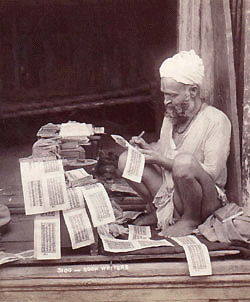
Narottam - The Brahmin
Describing the importance of five virtuous deeds, Pulastya said to Bheeshma: "The five supreme virtuous deeds are -- obedience to parents, faithfulness towards husband, equanimity, not having enmity towards friends and devotion towards Lord Vishnu. By pleasing his father, one pleases all the Deities. Mother is superior even to all the places of pilgrimage combined together.
Pulastya then narrated the same tale to Bheeshma, which lord Brahma had once told some prominent sages: "Once, there lived a famous Brahmin called Narottam. He had acquired divine powers on account of his austere penance but unfortunately he never treated his parents with respect. After taking his daily bath, Narottam hanged his wet clothes in the open sky without any support and they used to dry without falling down on the earth. This special power had made him very arrogant. One day, a crane flying in the sky passed dung on his face, which made him very furious. Narottam cursed the crane, as the result of which it was burnt to death. His special power vanished due to the sin acquired by killing an innocent bird. Now, no longer his clothes remained in suspended position in the sky.
Narottam became very sad. Suddenly he heard a heavenly voice instructing him to see a chandala named Mook. "His discourses would be beneficial for you", said the heavenly voice. Narottam went in search of Mook the chandal and found him in the servitude of his parents. Mook was a great devotee of his parents and his total devotion towards his parents had blessed him with an extraordinary power -- his house used to hang in the air without any support. Narottam was deeply amazed at this wonderful sight. He wanted to know how Mook had acquired such divine powers. But, Mook requested him to wait, which made Narottam very angry. Mook then told Narottam, "I can talk to you only after attending to my parents. I am not that crane which was charred to death by your curse. If you don't have time, then go and meet that faithful wife. She will answer your questions."
Narottam did not know where that faithful wife lived, so he stood there wondering what to do next. Suddenly Lord Vishnu emerged from Mook's house disguised as a brahmin. He took Narottam to the faithful-wife's house. All along the way Lord Vishnu preached to Narottam on the qualities of a chaste woman. As both of them were about to reach that chaste woman's house, Lord Vishnu disappeared, leaving Narottam all alone.
Narottam requested the woman to enlighten him on the finer points of virtuosity. But, the woman was busy attending her husband and requested him to wait. Narottam threatened to curse her, to which the woman replied -- I am not that crane whom you had cursed. If you are in a hurry then you can go and meet Dharm-Tulaadhar. He is an honest businessman and is capable of answering your queries."
Lord Vishnu once again appeared from that woman's house disguised as a brahmin. Narottam asked him as to how were both Mook and faithful-wife aware of the incident in which the crane was charred to death? Lord Vishnu told him that both of them had acquired this special power by the virtue of their respective religiousness.
Lord Vishnu and Narottam proceeded towards the place where Dharmtuladhar did his business transactions. As they were about to reach the place, Lord Vishnu disappeared once again, leaving Narottam all alone. Narottam saw Dharmtuladhar busy in his dealings, with total honesty. He requested him to reveal as to what made the wet clothes hang in the air without any support. Dharmtuladhar requested him to wait, but Narottam was in a hurry to get answer to his questions. Dharmtuladhar told Narottam, 'Please wait for sometime, as I am busy doing my business transactions. If you don't have time then you can go and meet Adrohak, who is fully capable of giving answer to your questions.' Lord Vishnu once again accompanied him, disguised as a brahmin.
When both of them were about to reach the place where Adrohak used to live, Lord Vishnu disappeared and Narottam was left all by himself, once again. Narottam requested Adrohak to preach on the essence of religiousness. Adrohak was a man of impeccable conduct and had full control over the sensual urges. He advised Narottam to meet the supreme devotee of Lord Vishnu, who lived nearby. Adrohak said, 'You would get answers to all your questions. He will reveal to you the reason that made wet clothes to hang in air without any support.'
Narottam then proceeded towards the place where the supreme devotee of Lord Vishnu lived. Lord Vishnu once again accompanied him in the guise of a brahmin. After reaching there, Narottam expressed his desire of seeing Lord Vishnu. The supreme devotee took him to a temple situated inside the house-premise.
Narottam was amazed to see the same brahmin who had been accompanying him all along the way, sitting on a lotus flower. He realized that the brahmin was Lord Vishnu himself. Lord Vishnu blessed him and said, "Be respectful towards your parents, if you want to attain to my abode. I dwell in the houses of people who are virtuous, truthful, possessed of equanimity and who have full control over their passion. This is why you found me present at the homes of the chandal, Tuladhar, and Adrohak."
Narottam realized his mistake and decided to be in the servitude of his parents for the rest of his life.
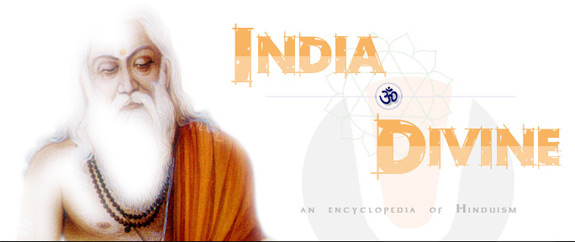
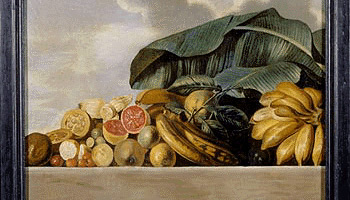
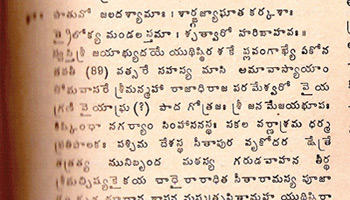
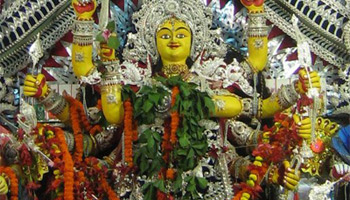
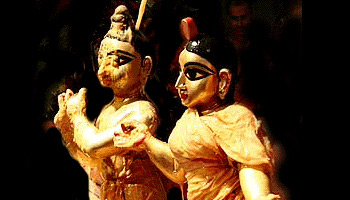
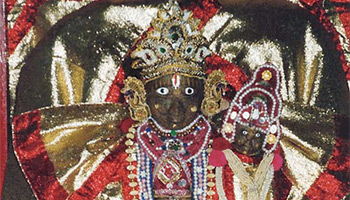
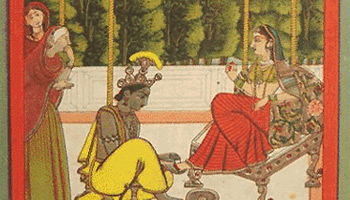
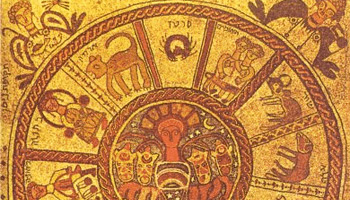
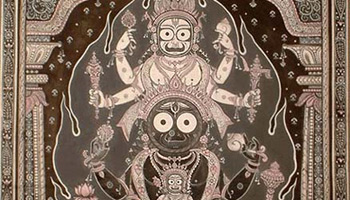
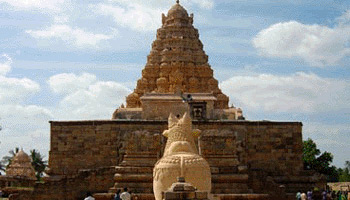
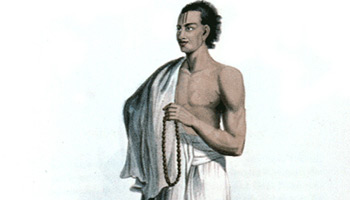
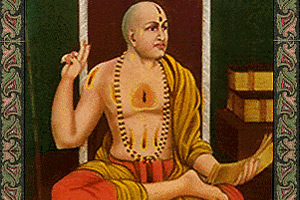
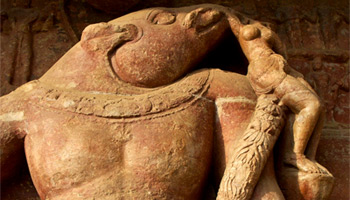
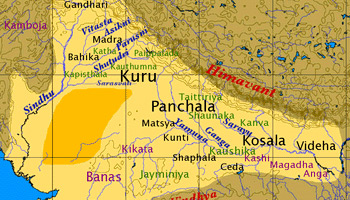
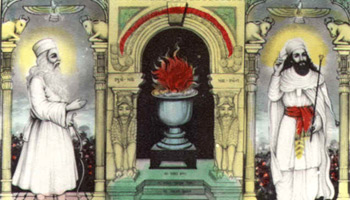
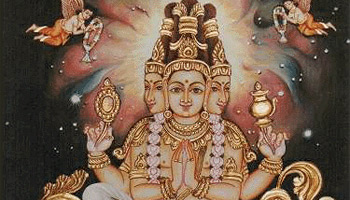
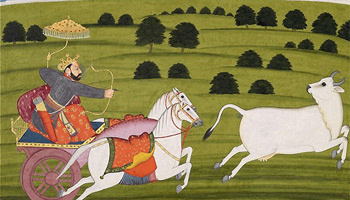
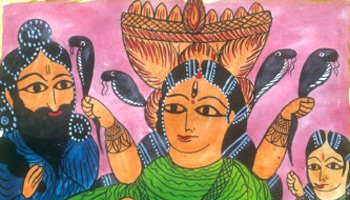
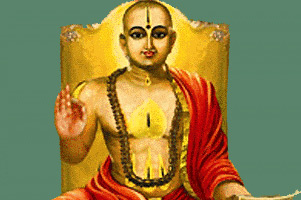
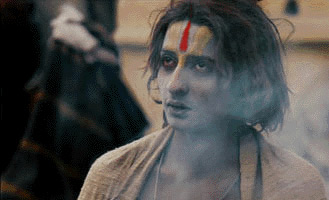
No hay comentarios:
Publicar un comentario